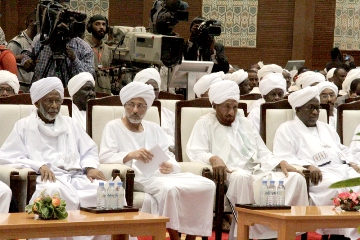Sudan’s SCP proposes 60-day suspension of laws restricting freedoms
March 8, 2014 (KHARTOUM) – The Sudanese Communist Party (SCP) has announced its readiness to engage in dialogue with the ruling National Congress Party (NCP) provided the government ends civil wars and creates an environment conducive for dialogue.

He called upon president Omer Hassan al-Bashir to issue a decree ending military conflicts in the country and suspending laws restricting freedoms for 60 days before adding that the government can reverse this move if national dialogue reached a deadlock.
Youssef criticised the rush of some political parties to engage in the dialogue process and called for an agreement on mechanisms governing it, stressing that the outcome of the dialogue should focus on how Sudan must be governed not who must govern the country.
The SCP official disclosed that opposition forces furnished the ruling party with written views reflecting their stances on dialogue issues, calling for forming specialized committees to arrive at a specific national program that must be agreed upon.
The deputy chairman of the opposition National Umma Party (NUP), Sideeg Ismail, for his part, revealed that his party is mediating between the NCP and the opposition alliance known as the National Consensus Forces (NCF), saying they had handed Bashir a written initiative for building trust between the two sides.
He stressed that Bashir is keen to personally lead the initiative, adding that if the government and opposition parties agree to sit in a roundtable for dialogue, they could resolve the country’s issues in a mere week.
The NUP official also called for creating an environment conducive for dialogue and removing the lack of trust barrier between the NCP and the opposition parties.
In a separate statement, the NUP said that it has proposed the “national agenda” for more than two years in which it diagnosed the regime’s failures and outlined its vision to achieve just and comprehensive peace and complete democratic transformation.
The party pointed out that its theses identified the means to achieve the new regime, including a peaceful uprising that uses all means except violence or with backing of foreign powers. This would help transform the government from a state of war to a state of peace and the country from a party’s state to a national state.
It went on to say that it agreed to Bashir’s call for a dialogue that would be open and excludes no one and imposes no limits on the outcome.
But the opposition party stressed that the dialogue should be governed by a timetable and specific mechanisms that is headed by an independent and agreeable figure.
This would lead to a roadmap that achieves a national peace process, a national constitution drafting process, a national economic reform and integrity of the general elections in an atmosphere of freedoms.
These commitments would form the basis of a national government that would run the country until the making of a new constitution is completed and free elections are held after ensuring its fairness.
The government must also undertake confidence building measures pertaining to last September fuel protests, political detainees, freedoms, press freedom, a positive response from opposition to dialogue call and have all sides refrain from profanities that undermines the dialogue strategy.
With regards to the peace process, the party reiterated its warning that bilateral talks that take place without preparation will not achieve the desired just and comprehensive peace. This would require agreement on a declaration of principles that is made up of ten articles. If they are agreed upon then the Sudan Revolutionary Front (SRF) would be recognized as a partner in a peace process run by a National Peace Council.
The Sudanese president said in his address that rebel groups will be accepted into the dialogue only if they lay down arms. But the SRF has brushed aside Bashir’s offer.
The party warned that should the NCP rejects this approach then the NUP will abandon the dialogue which will not benefit the nation or achieve the people’s aspirations.
Meanwhile, the political secretary of the opposition Popular Congress Party (PCP), Kamal Omer Abdel-Salam, ruled out that recent statements made by president Bashir would negatively impact the anticipated national dialogue.
Bashir, who addressed the closing ceremony of the seventh Red Sea Tourism and Shopping Festival in Port Sudan on Thursday, renewed his government’s refusal for forming a transitional government or delaying the 2015 elections.
Abdel-Salam said the main objective behind his party’s acceptance for the national dialogue is to dismantle the totalitarian regime and end civil wars besides allowing freedoms and discussing the Sudanese identity.
He said the NCP’s insistence on holding the general election in 2015 underscores that it only uses the national dialogue as means to win time.
“If general elections are be held on time it means that national dialogue is worthless”, he added
In late January, Sudanese president Omer Hassan al-Bashir delivered a live televised speech to the nation in which he announced a four-point plan for reform “to stop the war and bring peace, free political society, fight against poverty and revitalize national identity”.
Sudan’s opposition parties have proposed forming a transitional government and holding a national roundtable with the participation of rebel groups to discuss a peaceful solution for the conflicts in Darfur, South Kordofan and Blue Nile states.
In accordance with the opposition platform the interim government would organize general elections once a political agreement on constitutional matters is reached, inaugurating a new democratic regime.
But the NCP rejects this proposal, saying opposition parties must simply prepare for the 2015 elections and that rebels should first sign peace accords and lay down arms.
The NUP and the PCP are the only opposition parties to announce their acceptance of Bashir’s call for national dialogue.
(ST)
